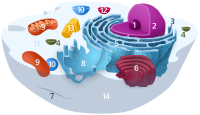
Photo from wikipedia
The autophagy lysosome pathway is essential to maintain cell viability and homeostasis in response to many stressful environments, which is reported to play a vital role in cancer development and… Click to show full abstract
The autophagy lysosome pathway is essential to maintain cell viability and homeostasis in response to many stressful environments, which is reported to play a vital role in cancer development and therapy. However, the association of genetic alterations of this pathway with risk of cancer remains unclear. Based on genome‐wide association study data of eight kinds of cancers, we used an adaptive rank truncated product approach to perform a pathway‐level and gene‐level analysis, and used a logistic model to calculate SNP‐level associations to examine whether an altered autophagy lysosome pathway contributes to cancer susceptibility. Among eight kinds of cancers, four of them showed significant statistics in the pathway‐level analysis, including breast cancer (p = 0.00705), gastric cancer (p = 0.00880), lung cancer (p = 0.000100) and renal cell carcinoma (p = 0.00190). We also found that some autophagy lysosome genes had signals of association with cancer risk. Our results demonstrated that inherited genetic variants in the overall autophagy lysosome pathway and certain associated genes might contribute to cancer susceptibility, which warrant further evaluation in other independent datasets.
Journal Title: International Journal of Cancer
Year Published: 2018
Link to full text (if available)
Share on Social Media: Sign Up to like & get
recommendations!